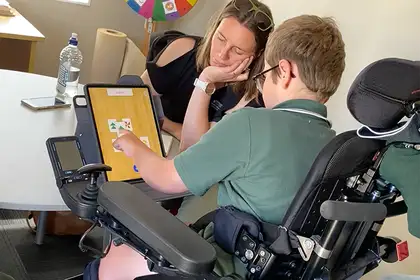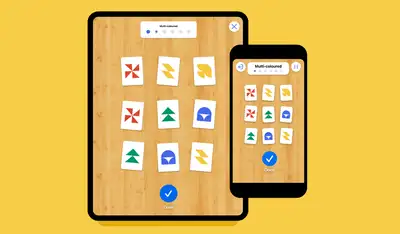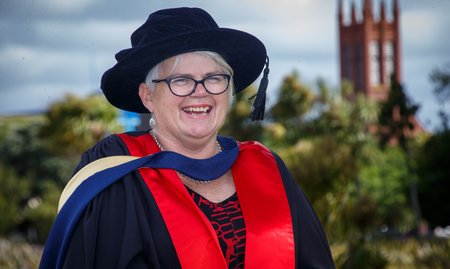
For 17 years, Senior Lecturer Nicola McDowell unknowingly lived with cerebral visual impairment (CVI) after suffering a brain haemorrhage at 16 years old. Living with undiagnosed CVI meant she struggled with learning at school and university, was bullied, and spent countless appointments with ophthalmologists who could not provide answers.
In 2013, she was finally diagnosed with CVI and has since dedicated much of her career to researching the condition and creating tools to help others diagnose it too. She has just been recognised with a CVI Champion Award at an International CVI conference for being a ‘transformative leader in the field’.
Cerebral visual impairment occurs because of an injury or damage to the brain, but because it affects the vision without impacting the eye, it is difficult to pick up through a basic eye test by an optometrist and often goes undiagnosed. Premature birth is one of the main causes of CVI and any child born before 32 weeks has an 86 per cent chance of having visual issues based on injury or damage to the brain.
The Austin Assessment
Dr McDowell, who works for Massey University’s Institute of Education, began her career as a specialist teacher for children who are blind and low vision. One of the children she worked with was eight-year-old Austin who had cerebral palsy, reduced visual acuity and CVI. One day, while playing a maths game which required Austin to match two cards together, Dr McDowell discovered it was a visual problem that was leading to him being unable to complete the task and that his CVI was stopping him from being able to match the pairs.
“That’s when I got the idea of a simple, fun, card matching game to help identify children with difficulties associated with CVI, which led me to creating the Austin Assessment.”
Fast-forward six years, four research projects, 900 children’s assessments and a global pandemic, and the Austin Assessment was born. The development of the tool was supported by funding from Massey Ventures and the Massey University Foundation, which helped turn the idea into a reality.
“The support from Massey, my PhD research supervisors through to the research grants to be able to do the research, has made a huge difference. To be in an environment where you have an idea, have the support to research something then develop and create it, is amazing.”
She says it has been a long road and becoming an entrepreneur on top of working full-time has not been easy, but she wanted to ensure “no children have to suffer like I did.”
“My journey was horrendous. I struggled in class, was bullied, struggled accessing learning, scraped through my first year at university and my first degree, attended countless ophthalmologist appointments and because of all this, I suffered huge mental health issues. I do not want other kids sitting in a classroom struggling for so long."
She says if the Austin Assessment was available to help with an earlier diagnosis, her life would have been different and so she wants to reach as many families as possible.
The need for a tool like this is urgent: research has shown 3.4 per cent of children in mainstream education have these visual difficulties, which is roughly one child in every class in Aotearoa New Zealand. Additional research she undertook shows 80 per cent of these children have learning difficulties and learning support needs, 90 per cent have trouble with social interactions and making friendships, and all of them have difficulty with regulating their emotions and have high levels of anxiety.
“These kids really need support but because the visual issues are caused by damage to the brain, they are not easily picked up by a basic vision test. Most of the time they have normal visual acuity and can read to the bottom of an eye chart because CVI is related to problems with the brain. That means it is hard to diagnose and children are getting diagnosed with other conditions because they appear to be having learning and behaviour difficulties.”

The tool is gaining international attention with world-wide downloads
How the Austin Assessment is helping families
Maree is mum to thirteen-year-old Oscar and like many families during the New Zealand lockdown, homeschooling became the new normal. During this time, she says it became clear something wasn’t quite right in terms of Oscar’s ability to engage with and manage his schoolwork. An Educational Psychology Assessment revealed that despite having normal range intellectual abilities, he was challenged with a significant learning disability and dyslexia.
"Diving deeper into the report I could see that something may also be going on with his visual processing, beyond what a standard eye check could diagnose, and that gnawed at the back of my mind. I felt frustrated and guilty that my lack of understanding, the perceived expense and complexity of diagnosis and the load we were already carrying in terms of getting him other support had me so easily ignore this avenue of exploration.
“But frankly, becoming the necessary experts in our son’s learning disability and dyslexia, plus navigating the school system and being his advocate felt like more than enough to manage on top of our full time jobs and family workload. We had limited bandwidth and limited resources.”
Then, by chance, she came across the Austin Assessment through her work at a digital agency, which was working on the tool.
“The Austin Assessment helped me to immediately join the dots. This tool could, without the time and considerable expense of travelling to a specialist out of region, indicated our son had CVI related visual issues. Understanding what might be going on with his visual processing and what smart next steps to take was now within reach for us.”
She says the tool then provided extensive support information after the assessment, with access to a number of different resources if the assessment yields a positive result.
“We are grateful to have, through luck, come across this tool. It has removed the very real financial barrier that was in place previously, and simplified and humanised what felt like a daunting potential journey in the health system. It has given us simple, practical next steps and rich support for our son. My hope is that this important resource and the benefit it provides scales quickly. It’s valuable, it’s needed and it makes a difference.”
The Austin Assessment is available for both families and professionals on the Apple App Store.
Related news
Doctor of Education tackling maths anxiety among primary teachers
Maths anxiety is a pervasive phenomenon globally that not only affects students but can also impact those that teach maths.
